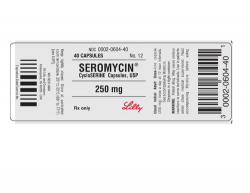Seromycin (cycloserine) Coupons, Discounts & Cost
Seromycin contains cycloserine - this is a bactericidal antibiotic with a wide spectrum of action. One way to save money on the Seromycin retail cost regardless of income and insurance status is to use Seromycin coupons or discount cards from RXCoupons. Use this Cycloserine coupon at this online pharmacy and receive up to 75% off the sale price.
What should I know about Seromycin?
Seromycin contains cycloserine - this is a bactericidal antibiotic with a wide spectrum of action. It suppresses the enzymes that are responsible for the synthesis of the cell wall. Cycloserine works against mycobacterium tuberculosis. It is often used in chronic forms of tuberculosis (in case of resistance to other anti-tuberculosis drugs).
When should I use Seromycin?
Cycloserine is used for the treatment of pulmonary tuberculosis, extrapulmonary tuberculosis (including kidney tuberculosis) after unsuccessful treatment with other drugs (rifampicin, isoniazid, streptomycin and ethambutol). Cycloserine should be used in combination with other anti-tuberculosis drugs. This drug is also effective in acute infections of the urinary tract caused by sensitive strains of gram-positive and gram-negative bacteria.
What should I know about Seromycin contraindications?
Cycloserine is contraindicated in the following cases: hypersensitivity to cycloserine, certain diseases of the central nervous system, epilepsy, epileptic seizures, mental disorders (anxiety, psychosis, depression), severe renal failure, heart failure, lactase deficiency, lactose intolerance, lactation period. Seromycin should not be used in patients under the age of 3 years.
Caution: children from 3 to 18 years of age, chronic renal failure.
Seromycin should be given to pregnant women only in cases of extreme necessity.
How should I use Seromycin?
The drug should be used immediately before meals (or after meals in case of irritation of the mucous membrane of the gastrointestinal tract).
The usual dose is from 500 mg to 1 g per day. The initial dose for adults is 250 mg twice daily with a 12-hour interval (during the first two weeks). The daily dose should not exceed 1 g.
Children: the usual initial dose is from 10 mg/kg of body weight per day. The daily dose should not exceed 0.75 g.
Elderly patients (older than 60 years), patients with a body weight of less than 50 kg: use 0.25 g 2 times a day.
The course of treatment in infections of the urinary tract: 7-10 days. The course of treatment in tuberculosis: 6 months or more.
What should I know about Seromycin side effects?
Most of the side effects observed during treatment were associated with impaired central nervous system function. The following side effects were observed:
CNS: convulsions, drowsiness, headache, tremor, dizziness, loss of memory, psychoses, suicide attempts, irritability, aggressiveness, hyperreflexia, paresthesia, clonic convulsions and coma.
Cardiovascular system: heart failure (at doses of 1000-1500 mg per day), megaloblastic anemia.
Digestive system: nausea, heartburn, diarrhea (especially in elderly patients with liver disease).
Allergic reactions: skin rash, itching.
Other reactions: deficiency of folic acid.
Acute overdose can occur if the patient takes more than 1 g. Chronic toxicity is dose dependent (if more than 500 mg of cycloserine is administered daily). Usually, toxic effects include headache, dizziness, confusion, irritability, paresthesia, dysarthria, psychosis, convulsions and coma. Ethanol may increase the risk of epileptic seizures.
What should I know about interaction with other drugs?
It is reported that ethionamide enhances the neurotoxic effects of the drug. Alcohol and cycloserine should be avoided (especially with high doses of cycloserine). Alcohol increases the risk of epileptic seizures. Patients taking cycloserine and isoniazid should be under the supervision of a physician.
Special instructions
Patients should monitor hematological indicators and liver function during treatment.
It is necessary to exclude possible factors of overheating (exposure to the sun, hot shower).
Treatment with cycloserine should be canceled if the patient suffers from allergic dermatitis.
The risk of seizures increases in patients with chronic alcoholism.
Anticonvulsants or sedatives can be effective in preventing the symptoms of central nervous system damage (such as seizures or tremor).

